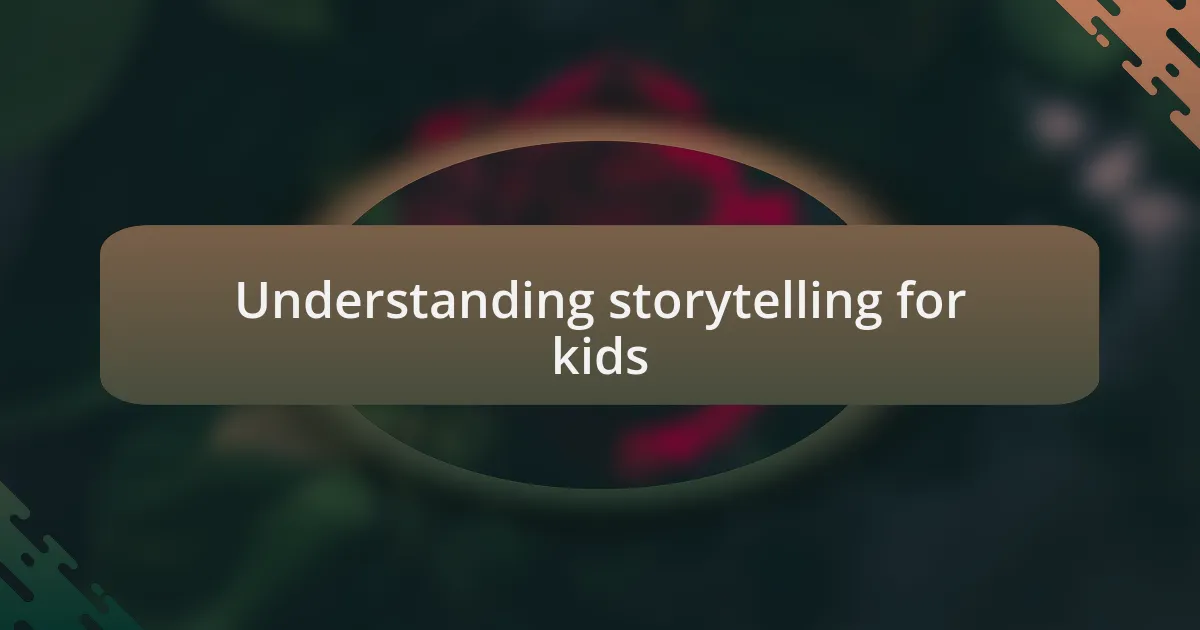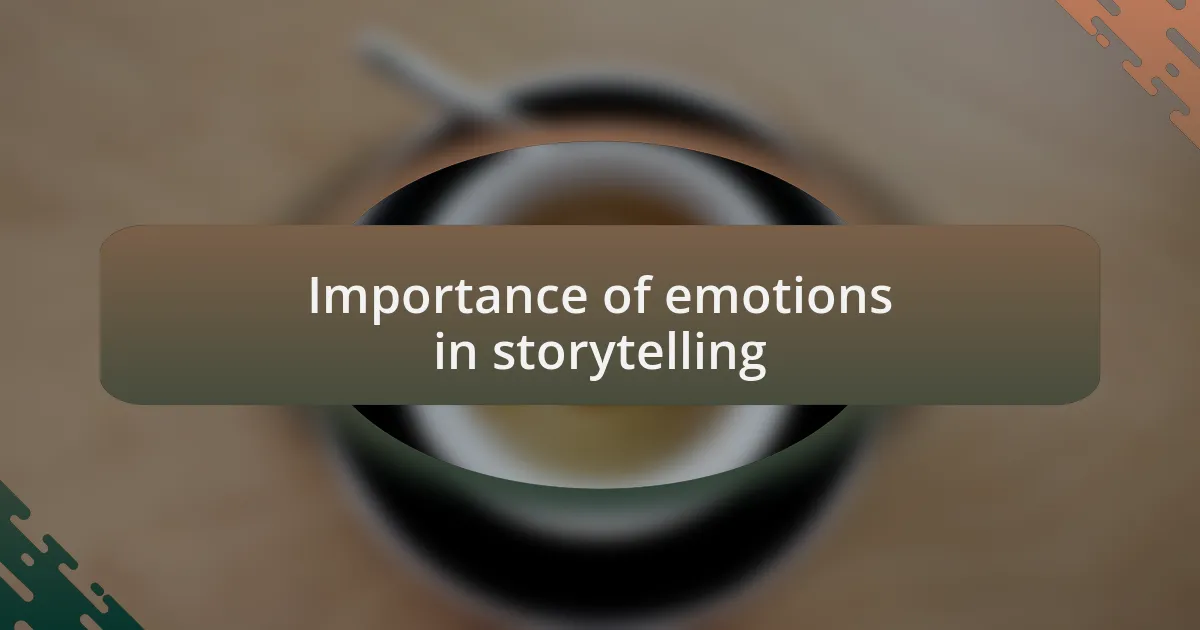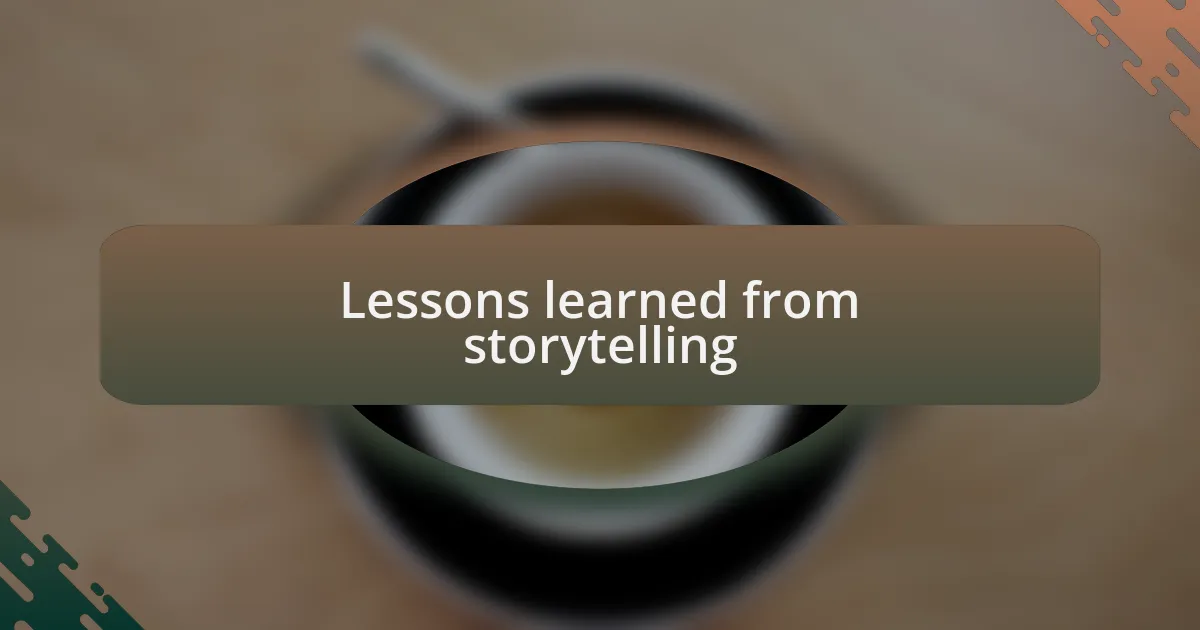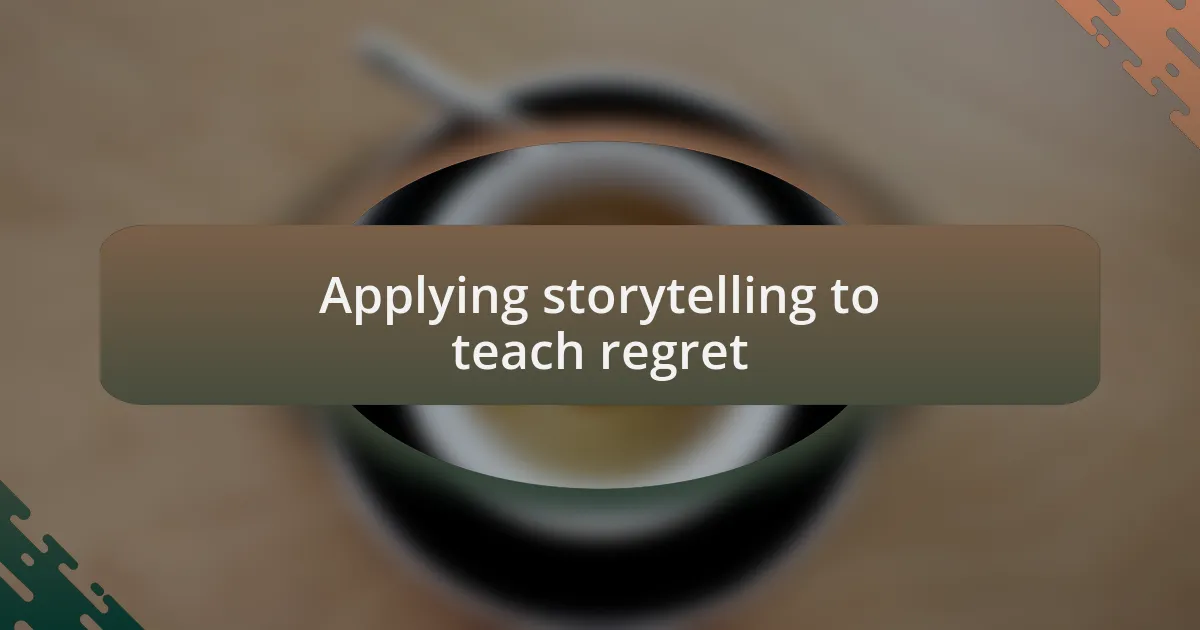Key takeaways:
- Storytelling engages children’s emotions, fostering empathy, understanding, and valuable life lessons, such as resilience and responsibility.
- Regret in stories allows children to reflect on their own experiences and promotes discussions about kindness, compassion, and personal growth.
- Sharing personal stories of regret can create connections and encourage children to express their feelings in a safe space.
- Storytelling serves as a transformative tool, equipping children with insights that help them navigate life’s complexities and learn from their mistakes.

Understanding storytelling for kids
Storytelling for kids is a powerful tool that not only entertains but also teaches valuable life lessons. When I recall the bedtime stories my parents shared, I can still feel the warmth and comfort that those moments brought me. Have you ever noticed how a well-told story can pique a child’s curiosity? It fosters imagination, helping them to explore worlds beyond their own.
What’s fascinating about storytelling is how it allows children to connect emotionally with characters and situations. I remember when my niece sat wide-eyed, captivated by a tale of a brave little mouse overcoming fear. It opened up a discussion about her own fears, showing me firsthand how narratives can provide a safe space for children to express their feelings and learn from them.
As children engage with stories, they are not just passively listening; they are actively shaping their understanding of right and wrong, friendship, and perseverance. How can we, as storytellers, harness this engaging power to instill positive values in our kids? I often think about the moral lessons embedded in fables and fairy tales, and I strive to incorporate similar themes when sharing my own stories.

Importance of emotions in storytelling
Storytelling thrives on emotions; they are the very fabric that binds characters to the hearts of young listeners. I remember once telling a story about a child who lost their favorite toy. When I described their sadness, my own child’s brow furrowed in concern, and he genuinely empathized with the character’s feelings. This connection made the narrative unforgettable and sparked conversations about loss and comfort.
Emotions help to create vivid imagery in the minds of children. The excitement in a hero’s triumph or the tension in a villain’s chase can transform an ordinary sequence of events into an extraordinary journey. I still treasure the expressions on my students’ faces when I raised my voice in dramatic moments. They were on the edge of their seats, fully invested—a reminder that engaging emotions is key to effective storytelling.
Navigating emotions in storytelling cultivates a deeper understanding of life’s complexities. When characters face dilemmas or joy, children dissect these experiences, learning valuable lessons. It begs the question: How can we, as storytellers, use emotion to guide children in their own lives? Personally, I find that weaving emotional threads into my stories enriches their development, equipping them with empathy and insight as they grow.
How regret influences children’s stories
Regret often serves as a powerful catalyst in children’s stories, instilling deeper emotional understanding. I recall telling a tale of a young prince who wished he could take back the harsh words he said to a beloved friend. The moment he expressed his regret, I could feel the shift in the room; my listeners leaned in, eyes wide, grasping the weight of his sorrow and the importance of kindness.
Characters grappling with regret offer relatable experiences for children. For instance, when I shared a story about a girl who neglected her pet, the kids nodded knowingly, as if recognizing a part of themselves. This reflection not only fosters empathy but also encourages children to think critically about their actions and the feelings of others—an invaluable lesson in responsibility and compassion.
Moreover, the resolution of regret can provide hope and closure in stories. After the prince sought forgiveness, I watched its impact on my audience; their expressions transformed from concern to relief. This promise of redemption assures children that it’s never too late to make amends, instilling resilience. Isn’t it fascinating how stories can teach such vital life lessons through the lens of regret?

Personal reflections on regret
Reflecting on my own experiences of regret, I often think about the school play I didn’t audition for. I was paralyzed by the fear of failure and didn’t realize until later how much I yearned to be on that stage. That regret lingered with me, serving as a reminder that sometimes, the biggest risk can lead to the most rewarding experiences.
I once overheard a child recount a story about a missed birthday party invitation because he didn’t reach out to his friend in time. The sadness in his voice was palpable, echoing a universal feeling. In that moment, I felt a tight pang in my own chest, remembering similar situations where missed opportunities created unnecessary gaps in connection. How often do we let fear hold us back from meaningful moments?
From my perspective, addressing regret doesn’t just mean acknowledging what we’ve lost; it also opens doors to understanding ourselves better. When I made a choice that hurt someone close to me, I felt a wave of regret, but it prompted a deeper reflection on my values and priorities. Doesn’t it seem that through these reflections, we learn more about what truly matters to us?

Lessons learned from storytelling
Storytelling is such a powerful tool for imparting lessons. I remember vividly the story my grandmother shared about her childhood. She spoke about a time when she let her fear of rejection silence her, missing the chance to join a group of friends for a picnic. It was a simple tale, yet it left a profound impact, reminding me that every missed opportunity shapes who we are. Isn’t it fascinating how stories, even from past generations, can resonate with our own experiences?
Through the tales we share, we often uncover deeper truths about regret and resilience. I once told a story in a workshop about a time I let a misunderstanding fester instead of clearing the air. As I narrated this moment, I felt the weight of regret roll off my shoulders. It was as if the very act of storytelling transformed my pain into a lesson, allowing others to learn from my mistake. Isn’t it powerful how sharing our vulnerabilities creates space for growth?
When we engage in storytelling, we do more than entertain; we reflect and grow. I often find that when I listen to children’s stories, their candidness reveals so much about their little struggles. One child shared how she regretted not sharing her favorite toy at school. In her innocent confession, I realized that storytelling not only serves to strengthen connections but also nurtures empathy and understanding. Doesn’t this simple exchange highlight how we can all learn from one another’s journeys?

Applying storytelling to teach regret
Storytelling can serve as a mirror for reflecting on regret, especially for children. I recall a time when my nephew, after hearing a story about a character who regretted not speaking up during a crucial moment, approached me with a heavy heart. He confided that he often hesitated to voice his opinions in class, fearing the reaction of his peers. This moment opened up an invaluable conversation about the importance of expressing oneself, exploring how regrets can be shared and transformed through storytelling.
When we weave tales of regret, it allows young listeners to confront their own feelings in a safe space. I once facilitated a session where children were encouraged to share their regrets through small skits, using characters to express what they felt. One young boy acted out a scene where he regretted not standing up for a friend who was being teased. Watching him navigate those emotions through play made me realize that sharing these stories not only fosters emotional intelligence but also empowers children to learn the art of resilience.
By harnessing the magic of storytelling, we create opportunities for children to learn important life lessons. Think about it: how might a story about missed chances inspire a child to seize their next opportunity? Each narrative holds the potential to illuminate the shadowy corners of regret, guiding children to understand that mistakes are not the end, but rather, stepping stones toward personal growth. It’s this transformative quality of storytelling that I find so profoundly impactful.